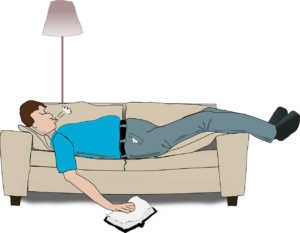When is snoring worth worrying about? A Q&A with a Stanford sleep surgeon
Jennifer Huber on December 28, 2016
 I’m a sensitive sleeper when it comes to snoring. When I visit my dad, his snoring — through walls and doors — keeps me awake. Pondering an upcoming holiday visit got me wondering: “Is that annoying snoring something to worry about?”
I’m a sensitive sleeper when it comes to snoring. When I visit my dad, his snoring — through walls and doors — keeps me awake. Pondering an upcoming holiday visit got me wondering: “Is that annoying snoring something to worry about?”
Snoring results from interrupted breathing during sleep. When someone’s upper airway repetitively collapses, vibrations from the soft palate and tongue can create the characteristic sound of snoring.
“Habitual snoring is a nuisance to bed partners,” Stanford sleep surgeon Stanley Yung Liu, MD, DDS, told me. “Many patients seek care because they’ve been asked to leave the bedroom and sleep on the living room couch.”
But snoring is often more than a nuisance. According to Liu, a patient should see a sleep specialist if snoring is accompanied by daytime complaints of sleepiness, headaches, or mood disturbances such as feeling anxious, irritable or depressed.
“Asleep patients are often unaware of breathing interruptions that have serious health risks,” Liu said. “Snoring is a warning sign of obstructive sleep apnea (OSA) — but not every snorer has sleep apnea, and not everyone with sleep apnea snores. Snoring and OSA can lead to serious health risks such as arrhythmia, high blood pressure, neurocognitive impairment and accidents due to sleepiness.”
While the bed partner is frequently the first to “diagnose” snoring and OSA, the gold standard diagnostic test is an overnight sleep study called a polysomnography. Performed at a sleep lab or at home, the study can track sleep disturbances and loss of oxygenation due to breathing interruptions.
Treatment greatly varies depending on whether a patient’s snoring is associated with obstructive sleep apnea and at what level — none, mild, moderate or severe. Liu explained the main treatments options:
- CPAP (Continuous positive airway pressure) is used for patients with all levels of snoring and OSA. A patient wears a nasal, oral or full-face mask that delivers positive air pressure to the upper airway during sleep. This stents open the airway, and prevents snoring and airway collapse.
- An oral appliance may be recommended for patients with snoring and mild OSA, when CPAP is not well tolerated. Nearly 40 percent of American patients are unable to use CPAP adequately. Worn like a night guard, the oral appliance pushes the lower jaw forward and stabilizes the airway.
- Surgical solutions for snoring and OSA can also be highly effective. Contemporary treatment planning is patient specific with consideration of upper airway anatomy, disease severity and patient preference.
Finally, Liu doesn’t want patients to get discouraged if one treatment option doesn’t work. He recommends going to a sleep center like Stanford, which has a comprehensive ‘playbook’ of solutions that can be individually adapted. “We can get folks sleeping on living room couches back into their bedrooms, and waking up feeling refreshed.”
Previously: Nothing to snort over: Why snoring should be taken seriously and Six simple ways to improve your sleep for the holidays
Illustration by: Clker-Free-Vector-Images




